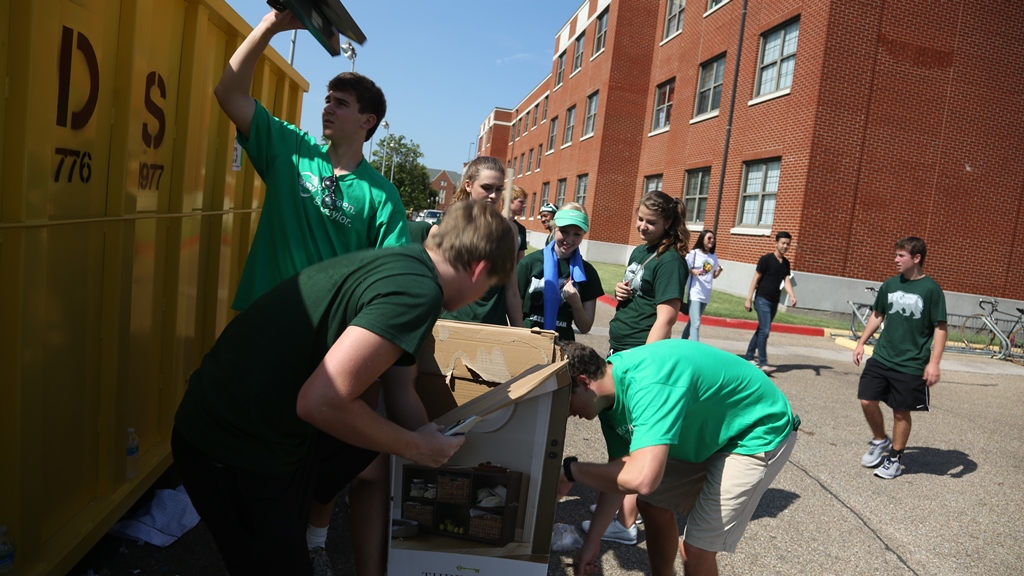Baylor Gets ‘Cool Schools’ Nod for Campus Sustainability Practices

One of Baylor's many recycling initiatives happens during Move-in days, as student volunteers with the Office of Sustainability collect and break down recyclable materials, diverting them from the landfill. (Matthew Minard/Baylor Marketing & Communications)
Contact: Lori Fogleman, 254-710-6275
Follow Lori on Twitter at @LoriBaylorU
Follow Baylor Media Communications on Twitter: @BaylorUMedia
WACO, Texas (Aug. 13, 2015) – Baylor University’s ongoing commitment to sustainability has garnered attention again, this time from the Sierra Club, which has named the university to its 2015 “Cool Schools” list.
Baylor is one of only four schools from Texas (others are Rice, Texas A&M and UT-Dallas) and one of only two Big 12 Conference schools (Iowa State is the other) among the 153 four-year colleges and universities honored for their campus sustainability practices.
To be considered, schools submitted a voluntary survey – the Campus Sustainability Data Collector – which is a collaborative effort among the Sierra Club, the Association for the Advancement of Sustainability in Higher Education, the Sustainable Endowments Institute and the Princeton Review. Once schools submitted their data, researchers scored each response and ranked each of the participating institutions on a variety of criteria, including overall sustainability program and outreach, water and energy consumption in buildings, waste reduction, recycling, and food and beverage purchasing policies, among other benchmarks.
“It is an honor for Baylor to be placed on the Sierra Club’s rigorous, and nationally recognized, Cool Schools List,” said Smith Getterman, assistant director of sustainability and special projects at Baylor. “Our success is the result of the hard work of our faculty, staff and students and should be seen as an indicator that Baylor University considers the judicious stewardship of our God-given resources a top priority. This is a great achievement for the entire university community and a great time for reflection on all that God has gifted us.”
Baylor’s top sustainable achievements over the past year include:
• Record recycling and overall decrease in campus waste: In 2014, Baylor set a new record for university recycling with 543.8 tons, surpassing the previous record by nearly 100 tons. The university also achieved a 143-ton increase in its recycling totals in just three years. Baylor also increased the amount of waste diverted from the landfill to 28 percent. “All of these records are set due to the participation of our campus community in initiatives like Move In recycling and reuse program and through the habitual everyday use of one of our more than 700 recycling bins located throughout campus and all of our athletics facilities,” Getterman said.
• Energy Awareness Program: Baylor residence halls participate in an energy curtailment competition every semester, which teaches best practices for energy use. As a result of these competitions, the university regularly sees energy savings of 4 to 6 percent each semester in residence halls. “Combined with our ongoing ‘Last Out, Lights Out’ initiative, LEED-certified buildings and other efforts, we’ve seen a noticeable decrease in campus energy expenditures,” Getterman said.
• Sustainability in Academics: Professors all over campus are conducting groundbreaking work in a wide variety of fields related to sustainability. Studying pollutants in whale ear wax, the effects of human drugs on waterways and water access issues are just a few of the ways professors and their students are engaged in sustainability-related research and teaching.
• Sustainable 2020: Announced in April 2015, this five-year plan will drive the university forward in achieving new levels of success in the stewardship of our resources in the areas of dining, waste, energy and water by 2020:
- Dining: 20 percent locally sourced food in residence hall cafeterias
- Waste: 30 percent diversion rate of university waste
- Energy: Greenhouse gas emissions reduction of 15 percent, from a 2010FY baseline, including growth
- Water: University wide water use reduction of 17 percent from a 2010FY baseline, including growth
For more information, contact Getterman at 254-710-3768 or Smith_Getterman@baylor.edu or visit the Office of Sustainability at Baylor.
ABOUT BAYLOR UNIVERSITY
Baylor University is a private Christian University and a nationally ranked research institution, characterized as having “high research activity” by the Carnegie Foundation for the Advancement of Teaching. The University provides a vibrant campus community for approximately 16,000 students by blending interdisciplinary research with an international reputation for educational excellence and a faculty commitment to teaching and scholarship. Chartered in 1845 by the Republic of Texas through the efforts of Baptist pioneers, Baylor is the oldest continually operating University in Texas. Located in Waco, Baylor welcomes students from all 50 states and more than 80 countries to study a broad range of degrees among its 12 nationally recognized academic divisions. Baylor sponsors 19 varsity athletic teams and is a founding member of the Big 12 Conference.